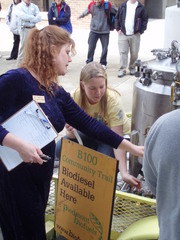VGCC Students, Area Residents See BioDiesel Demonstration

If biodiesel is a major part of tomorrow’s energy solutions, then about 100 students and visitors to Vance-Granville Community College recently peered into the future. The college’s main campus in Vance County hosted a Biodiesel workshop on March 29. The BioAgriculture Center, part of the state community college system’s BioNetwork, sponsored the event. J. D. Brooks, manager of the BioAg Center, based at Robeson Community College, was on hand to welcome the participants.Three representatives of the Piedmont Biofuels cooperative (www.biofuels.coop) presented a lecture and small-scale demonstration in the college’s Biotechnology lab, home of the Bioprocess Technology program. Piedmont Biofuels operates a biodiesel production facility in Chatham County, where they offer tours every Sunday afternoon at 1 p.m.Biodiesel is an alternative fuel derived from various fats and vegetable oils. Matthew Rudolf, the executive director of Piedmont Biofuels, told those in attendance that one of the first diesel engines ran on peanut oil, but since the 1913 death of inventor Rudolf Diesel, petroleum-based diesel fuel has dominated. Biodiesel is not simply vegetable oil. Diesel fuel injectors are not designed for viscous liquids like vegetable oil, so the biodiesel process turns the oil into a less viscous substance. Methanol is added to the oil in a reaction that uses potassium hydroxide (KOH) or Sodium hydroxide as a catalyst. The resulting biodiesel can be used in any diesel engine, according to Rudolf, although some fuel lines in older diesel engines may need to be replaced when using biodiesel. Biodiesel can also be blended in any proportion with petroleum diesel.Rudolf likes to call the fuel “liquid sunshine,” because it harnesses the energy of the sun that is absorbed by plants. A variety of plant oils can be used to produce biodiesel, but soybeans are currently the primary source. Other sources include canola and sunflowers. Biodiesel is biodegradable and non-toxic, and typically produces less net carbon dioxide emissions than petroleum-based diesel. The carbon dioxide released into the atmosphere when biodiesel is burned is recycled by growing plants, which are later processed into fuel. This is called a “closed carbon cycle.” In a variety of ways, Biodiesel benefits the environment, energy security and the economy. “No one piece of the renewable energy industry is the whole solution, but biodiesel is a pretty good part of the solution,” said Greg Austic, a Piedmont Biofuels intern.“Biodiesel is growing at a phenomenal rate,” Rudolf said. “It is the fastest growing alternative fuel in the United States.”After Rudolf’s lecture, Greg Austic and his fellow intern, Emily Warren, conducted a lab-scale demonstration, in which members of the audience took part in manually mixing a jar of biodiesel, before heading outside for a full-scale demonstration of their “Clean-Tech” mobile biodiesel processing system — a more efficient, mechanized method of producing the fuel. The generator that powers the biodiesel production runs on biodiesel fuel itself. Piedmont Biofuels intends to haul the system across North Carolina to help spread the news of biodiesel. Clean-Tech was made possible by a grant awarded to the Biofuels Program at Central Carolina Community College by the State Energy Office, which is part of the North Carolina Department of Administration. VGCC Bioprocess Technology program head Christine Klahn was excited about the opportunity to reach local farmers through the workshop. “Vance-Granville is here to serve the needs of the community, and we serve rural areas, so I was interested in connecting cutting-edge biotechnology to our local agricultural community. We had several farmers attend who were interested in sustainable agriculture. They might be able to produce biodiesel themselves, or they might produce the crops and sell them in the biodiesel market.” In addition to farmers, workshop attendees included VGCC science students, the Northern Vance High School Science Club and other members of the community.Also on hand for the event was the BioNetwork bus, operated by Ralph Shaw and Scott Hallam. The state-of-the art BioNetwork bus, the only mobile lab of its kind in the nation, travels with a qualified, industry-experienced instructor to provide a variety of customized, versatile, hands-on training solutions.The North Carolina Community College System’s BioNetwork is a statewide initiative that connects community colleges across North Carolina, providing specialized training, curricula and equipment, to develop a world-class workforce for the biotechnology, pharmaceutical and life sciences industries. All community colleges serving the pharmaceutical and biotechnology sector, including VGCC, are part of the BioNetwork. More information is available on the BioNetwork website (www.ncbionetwork.org/).Above: From left, VGCC instructor and Bioprocess Technology program head Christine Klahn examines the “Clean-Tech” mobile biodiesel processing system with Piedmont Biofuels intern Emily Warren. (VGCC Photo)

